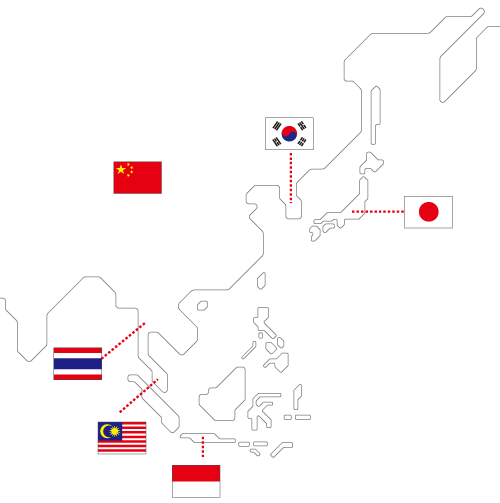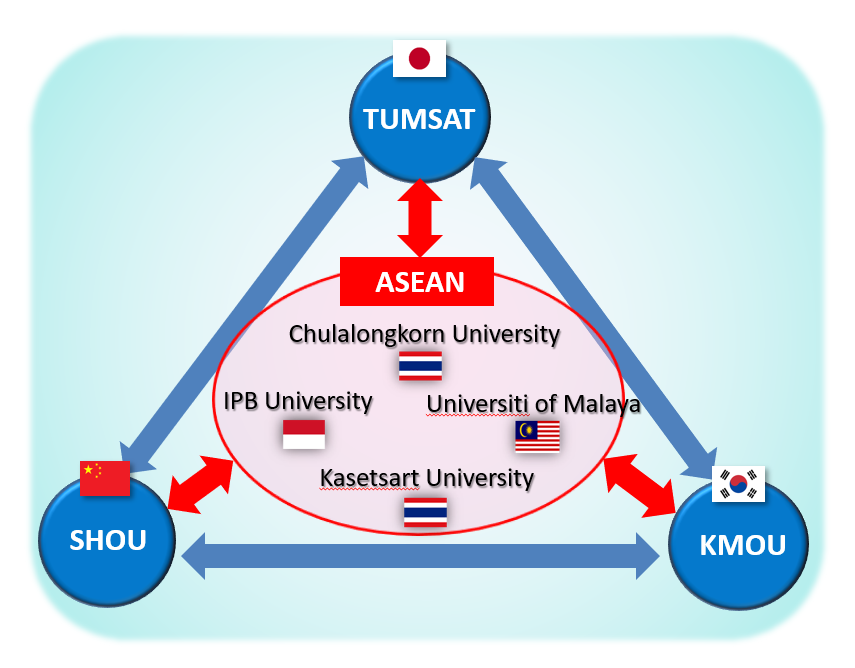INTRODUCTION
- HOME
- INTRODUCTION

OQEANOUS Plus Program is a student exchange program in Asian nations at graduate level based on the credit transfer system with quality assurance. This quality assurance is the same level as internationally recognized credit transfer system (Bologna Process).
Purpose
- To develop high-level professionals in the field of oceans
- To promote mutual development of education among Asian nations.
Inter-University Exchange Projects; OQEANOUS Plus Program

ABOUT program
Japan-China-Korea University Collaboration for International Practical Education in the Marine Field.
Tokyo University of Marine Science and Technology (TUMSAT), in consultation with Shanghai Ocean University (China) and Korea Maritime University (South Korea), has established the "Trilateral Erasmus" credit transfer student exchange system in Japan, China, and South Korea as the "OQEANOUS Program". This initiative aims to achieve quality assurance of education in accordance with the Bologna Process implemented in Europe and to foster international advanced professionals in the maritime field.
Since 2021, the OQEANOUS Program has been further expanding its international practical education under the name of "OQEANOUS Plus Program" by welcoming four new universities from ASEAN countries.
The name of this program, OQEANOUS, is derived from the Greek god of the sea ("OCEANUS"), which appears in Greek mythology.
Purpose
- Learning together with Students from Japan, Korea, China, and ASEAN Countries to Develop "True Global Citizens"
- To study together with students from Japan, China, Korea, and ASEAN countries.
- To overcome language barriers and understand the way of thinking of their own and other countries.
- To work on solutions to ocean-related problems, such as the protection and sustainable effective use of limited resources.
- Exercise leadership across national borders in the areas of industry, government, and academia.
- Develop human resources who can work as a team to develop theories and new technologies that lead to solutions to problems in a limited environment, in collaboration with others and in other fields.
Program Features
Global expertise in the maritime field
By taking courses at consortium schools in Japan, China, Korea, Thailand, Malaysia, and Indonesia, students acquire a global perspective, including cultural and social backgrounds for content comparison and ways of thinking, and acquire a high academic ability to integrate various "knowledge" for constructing theories to solve problems and developing new technologies.
Experience classes and research conducted around the world
By taking graduate school courses and research projects in foreign countries, students can not only conduct graduate school research, but also develop their global communication skills and their ability to deal with a wide range of highly specialized topics and issues.
Earn degree at two universities
Students stay in the host country for at least one year and earn credits, and conduct their thesis/dissertation research, at both home and the host university, aiming to obtain a degree from both universities (double degree). The Double Degree Program offers Master's (Master's Program) and Doctoral (Doctoral Program) degrees.
Support System
Scholarships and other financial aid programs are available to reduce the burden on students sent to study abroad.
- No entrance and tuition fees at the host university
- Accommodation is provided by the host university
- Airfare may be subsidized depending on the origin university
- Monthly scholarship support for local living expenses depending on the origin university
- Please check with coordinator of your country to see if you are eligible for scholarships andfinancial aid
Extensive support by the coordinators
- The coordinators from home and host universities will support you throughout the study abroad process.
External Evaluations by ECTS labeled Universities
The original OQEANOUS program has been established in cooperation with ECTS-labeled universities.
| February, 2016 | Study meeting with Ege University |
|---|---|
| March, 2019 | External evaluation by Nord University Evaluation result ( External Examiner Report 2019 ) |
| February, 2020 | External evaluation by Ege University Evaluation result ( External Examiner Report 2020 ) |
| March, 2021 | OQEANOUS survey results |
| July, 2023 | External evaluation by Nord University Evaluation result ( External Examiner Report 2023 ) |

